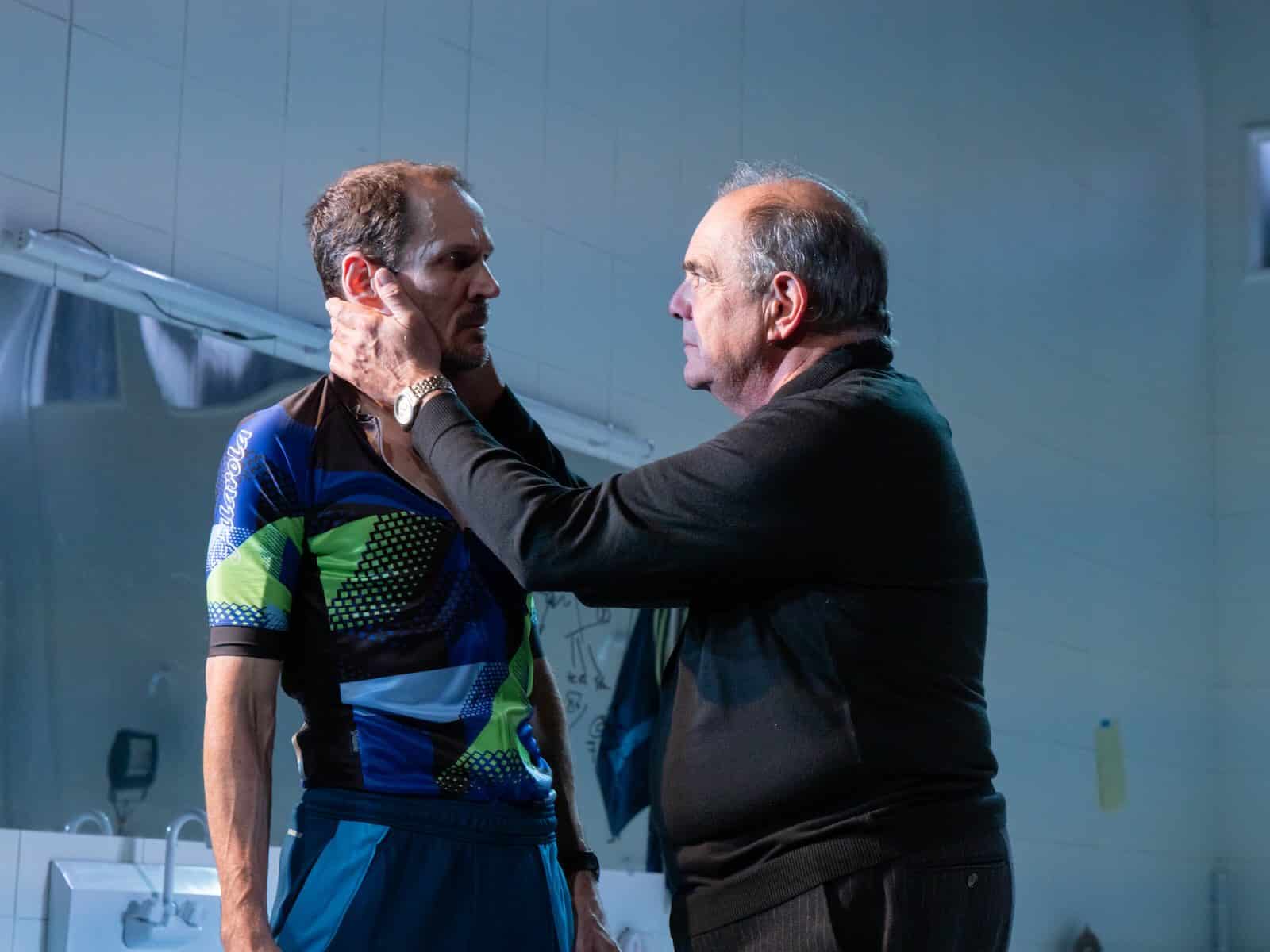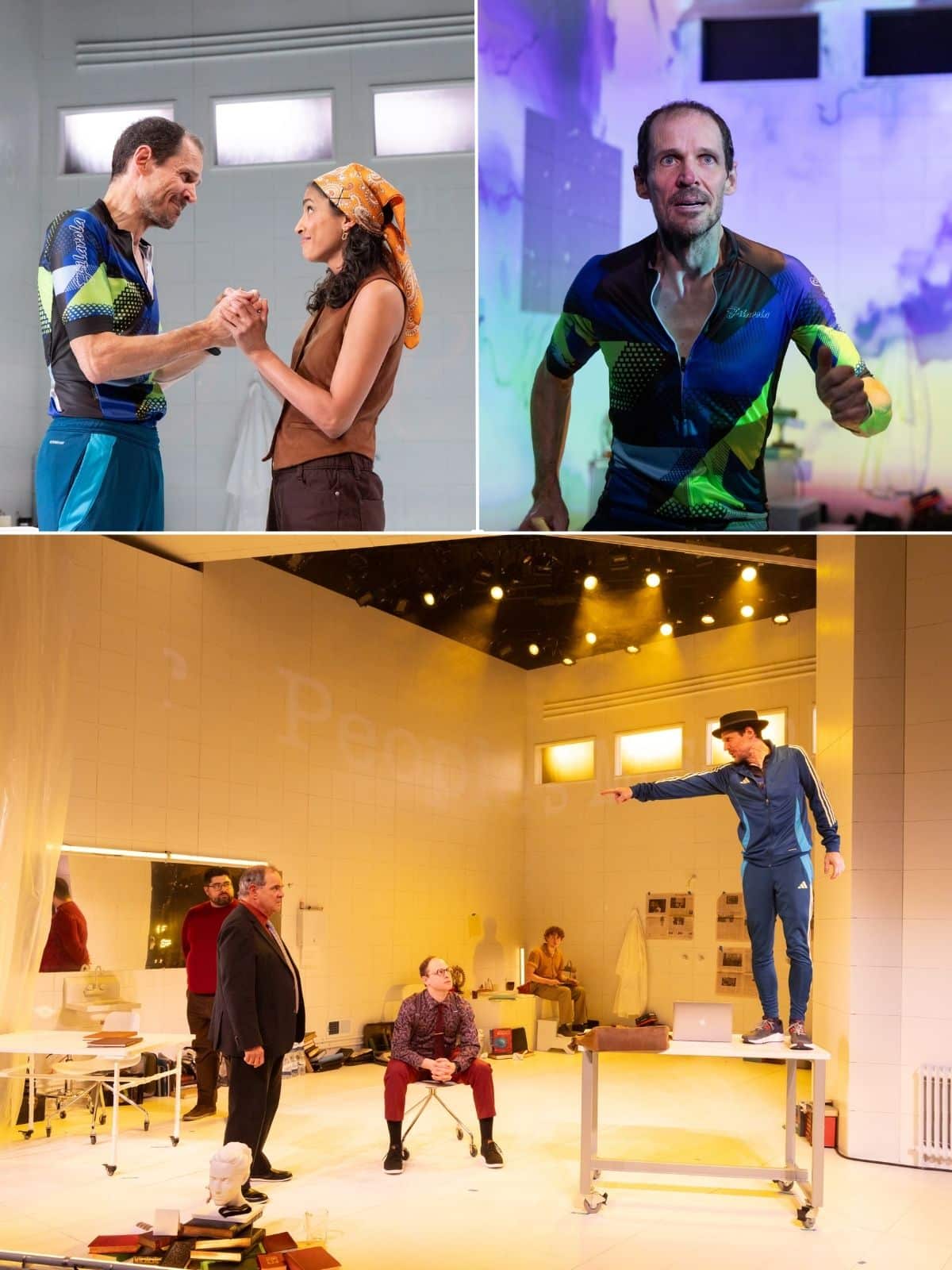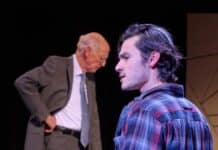“It is a little alarming to have lived here so long without realizing who our neighbors are.”
That woeful admission seems an understatement by the time it comes in An Enemy of the People, Henrik Ibsen’s treatise on truth that sees a town turn against a doctor whose microscopic discovery endangers their economic prosperity. This revival of Ibsen’s 1882 play, set in the present day, is now playing at Theatre J through November 23 in a new adaptation by Amy Herzog. But the realization that follows it says everything you need to know about director János Szász’s feeling of urgency and resignation in staging this drama: “And these people consider themselves to be free-thinkers.”
In a coastal Norwegian town, a wellness resort and its mineral baths have proven a boon to an otherwise depressed local economy. The resort was originally conceived by physician Thomas Stockmann (played by Joey Collins), who had lived in the northern country for years, treating the destitute locals. The health resort is now led by his brother Peter (Edward Gero), who serves as mayor of the town, and a board of wealthy investors. But when a typhoid outbreak sickens several visitors, Thomas investigates the water system that feeds the baths and discovers a proliferation of microscopic pathogens borne of pollution from nearby tanneries. Thomas understands the microbes may eventually kill the visiting bathers who often come to the town in poor health seeking to be healed by the waters, and though he is convinced he will be hailed as a hero for saving lives when his report is published in the local newspaper, he instead faces tremendous scorn from Peter, the resort’s investors, and his neighbors as they come to realize the news of the pollution will kill their burgeoning prosperity. As self-interest takes hold and Thomas’s friends surrender to their greed, he is deemed an “enemy of the people.”

One of the primary points of Ibsen’s very pointed play, of course, is that so often in politics, “the people” is an empty term, used by individuals to give credence to their own self-interest under the guise of widespread support. But a mob can grow quickly that way, and in An Enemy of the People, one influential individual after another lays claim to this nebulous, growing group of deniers either through willful ignorance or acceptance that others’ death is a necessary evil for their own survival. Ibsen has never been known for having a particularly light touch with any of his plays, but An Enemy of the People is acutely didactic, and it’s evident from the start that Thomas will be one of the few left with his integrity intact by the play’s end. Ibsen’s meticulously structured commentary on greed, political power, and self-interest is so compelling that he can get away with a relatively flawless main character whose worst offenses are arguably a snobby inability to remember his maid’s name and a handful of minor eccentricities (in Szász’s modern-dress production and Collins’s portrayal, he is a compulsive exerciser, donning a track suit or workout gear for nearly the entirety of the play). Even a controversial comparison between humans and dogs from the original text is softened here by Herzog to the point that the metaphor is quickly dismissed with one pithy line from the capitulating newspaper publisher, Hovstad (Aaron Bliden).
The production runs a little more than two and a half hours, but feels much shorter, thanks to Herzog’s taut adaptation and Szász’s expert pacing. What is most impressive about Szász’s production, though, is the sheer technical scale he achieves in Theatre J’s compact space. The static set (by Maruti Evans, who doubles as lighting designer) is ostensibly a changing room at the resort; stark and sterile, its top windows tower over the actors and occasionally let sunlight in, when an opaque shower curtain doesn’t bisect the space. But there’s something amiss here, as the room’s bleach-white floors and walls are littered with books, typewriters, and other symbols of curiosity and learning. Even a long mirror is covered with the doctor’s scribblings, distorting the characters’ reflections. It all proves a perfect canvas for media designer Mark Costello, who employs maximalist projection to signal changes in time and place, plaster modern examples of disinformation and disease — from microbes to social surveillance equipment — that dilute our sense of surety, and “livestream” a climactic town hall on social media. And sound designer Madeline “Mo” Oslejesk’s oscillating soundscape swings between romantic instrumentals and driving electronic beats. As thick as the production design is in symbolism, it is light on subtlety, which should come as no surprise to audiences who saw Szász’s stellar 2023 production of Angels in America: Millennium Approaches at Arena Stage (which also starred Gero); a small stage was encircled by a wide ring of sand, the cremated ashes of those who died in the AIDS crisis of the 1980s and ’90s.

But even if Szász’s directorial vision is clear and bold, when imposed on Herzog’s assertive adaptation of Ibsen’s already biting play, it goes too far in its heavy-handedness. Modern dress treatment of old plays can be a double-edged sword (costume designer Cody Von Ruden’s contributions run the gamut of colors, patterns, and materials), but here it cuts to the point of condescension. There is no denying here that Thomas is in the right, and Ibsen methodically picks off each proxy: the property owners (represented by Aslaksen, played by Dylan Arredondo) turn when they fear the taxes will get too steep; the news editor flips when he fears his over-taxed subscribers won’t pay for the paper; the anti-establishment townspeople overcorrect for the insinuation that they personally led to the town’s downfall. Aslaksen even says aloud: “I’m speaking from the point of my own interests.”
But in Szász’s production, the real-life equivalents for these fictional stand-ins are obvious to the point of straining the trusting bond he’s trying to build with the audience. It makes one feel that, like the people of Thomas’s town, we cannot be trusted to determine for ourselves who is right and what is true, even when it is so obvious in the context of the play. At the town meeting that Thomas calls to discuss his findings, Peter and Aslaksen demand the appointment of a moderating “chairman.” Thomas insists he intends to present a lecture, not a debate. One could argue that’s Szász’s mantra, too, and though the production is technically savvy and sound, it is often literal to the point that one feels they are being talked at, not talked to. This An Enemy of the People is less a thought-provoking drama than a morality play.
Even so, Collins leads an ensemble that spins an honest yarn. Unencumbered by Ibsen’s stock tendencies or the more overwhelming aspects of the production around them, they craft distinct, memorable characterizations. As Thomas’s daughter Petra, Reese Cowley is especially effective, balancing the character’s yearning to do something meaningful, independent of her father, with her responsibility to him and his drive for truth. Collins, who runs on a treadmill throughout intermission (in one of Szász’s more puzzling directorial moves), is relentlessly engrossing, though his character’s arc bends little. And a silly exchange about a signature porkpie hat only accentuates the growing menace Gero carries frighteningly into each scene.
Though Ibsen leaves little room for doubt that Thomas’s findings are true, the real world is not always so clear. A certain reading of An Enemy of the People could inadvertently embolden those whose notion of truth is warped to be more strident in their views, a spirit that has perhaps led to the polarization we live with today. But a more generous reading is what we would all do well to walk away with: a recalibration of our moral compass, a reaffirmation of the responsibility we have to others in our communities, and a reminder that truth can begin with us, but it must not end with us.
Running Time: Two hours and 45 minutes, one intermission.
An Enemy of the People plays through November 23, 2025, presented by Theater J at the Aaron & Cecile Goldman Theater in the Edlavitch DC Jewish Community Center, 1529 16th Street NW, Washington, DC. Purchase tickets ($39.99–$89.99, with member, student, and military discounts available) online, by calling the ticket office at 202-777-3210, or by email (theaterj@theaterj.org). Learn about special discounts here and accessibility here.
The program for An Enemy of the People is online here.
An Enemy of the People
Written by Henrik Ibsen
A New Version by Amy Herzog
Directed by János Szász
CAST
Joey Collins: Dr. Thomas Stockmann
Reese Cowley: Petra Stockmann
Edward Gero: Peter Stockmann
Aaron Bliden: Hovstad
Jeremy Crawford: Billing
Dylan Arredondo: Aslaksen
Nicholas Yenson: Captain Horster
Stephen Patrick Martin: Morten Kiil
Jakab Szàsz: Eilif
Set & Lighting Designer: Maruti Evans
Costume Designer: Cody Von Ruden
Sound Designer: Madeline “Mo” Oslejesk
Media Designer: Mark Costello
Properties Designer: Aoife Creighton
Production Stage Manager: John Keith Hall
Assistant Stage Managers: L Bruce, Natasha Sanchez
SEE ALSO:
Theater J to present timely adaptation of Ibsen’s ‘An Enemy of the People’ (news story, October 1, 2025)



